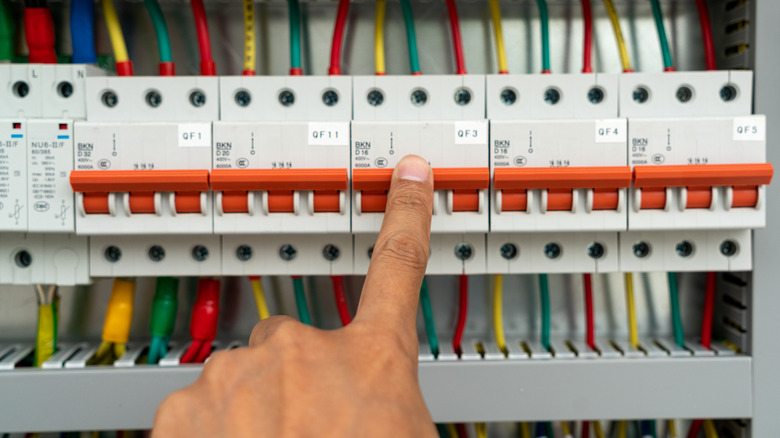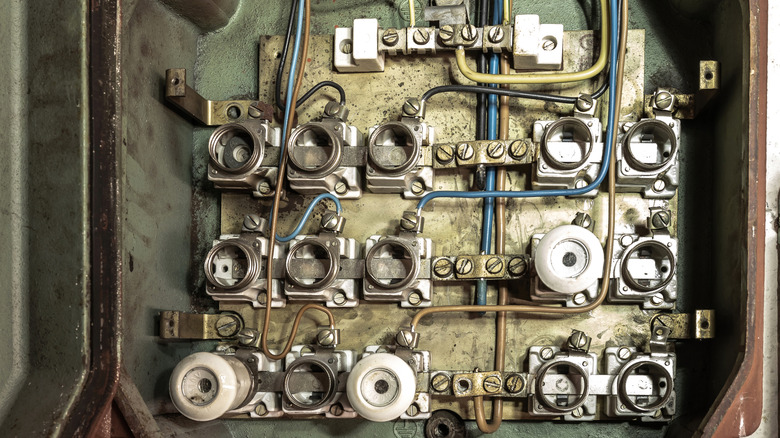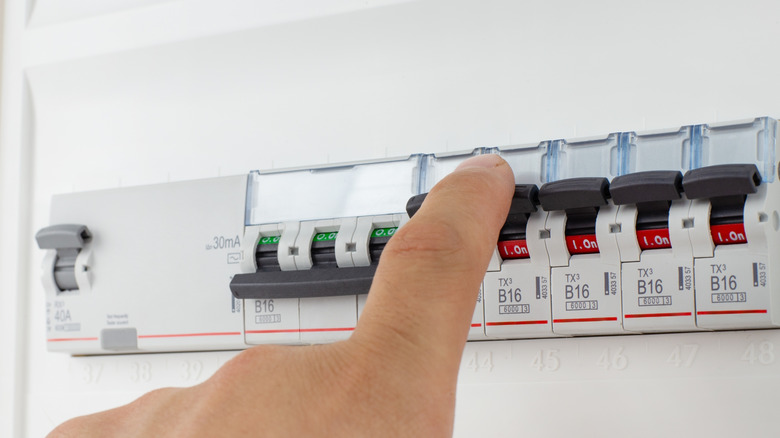Fuse Box Vs. Circuit Breaker: What's The Difference?
We may receive a commission on purchases made from links.
Anyone who's lived in a home or apartment has probably heard the terms "fuse box" or "circuit breaker" before. If you ever experienced a power outage in your home — with the power being cut in one or all rooms — you may have had someone tell you to "check the fuse box" to restore it. Both fuse boxes and circuit breakers are special devices attached to home power grids with the intention of protecting against dangerous electrical events like overloads and short circuits.
While the terms "fuse box" and "circuit breaker" are occasionally used interchangeably, though, they're actually completely different devices. They're both designed to keep you safe from electrical problems, but they go about it in different ways. Additionally, one kind of device may not be able to handle all of the same electrical problems that the other can. It's important to know the difference so that, in the event your home experiences an electrical problem, you can address it with the proper solution.
Fuse boxes use consumable fuses to protect against overloads
If you live in an older home, there's a good chance that there's a fuse box built into your power grid. In fact, the invention of fuse boxes actually dates as far back as the early 20th century, introduced as home electrical systems were first taking off.
As the name implies, a fuse box makes use of small gizmos called "fuses." A fuse is a simple device that's inserted between two power terminals in a fuse box, kind of like a battery. However, rather than supplying power, the fuse is meant to complete the circuit and allow power to flow through the terminals to its destination in your home. Within the fuse is a small length of wire filament, usually encased in ceramic or glass. In the event of an electrical overload, this sensitive filament will instantly burn out and melt into a pile of slag.
A fuse's sensitive constitution is deliberate — with the filament destroyed, the electrical circuit can't be completed, and the electricity stops flowing, putting a stop to the overload before something dangerous like an electrical fire can occur. The unfortunate downside is that fuses are strictly one-time use. Once a fuse burns out, it's completely useless, and needs to be replaced in order to restore power. This bit of inconvenience is a big reason why traditional fuse boxes in home have largely made way for circuit breakers in the last few decades. You do still see them in cars, though, and car fuse replacement is a regular sight in the D.I.Y. automotive scene.
Circuit breakers use mechanical contacts to protect against overloads and short circuits
If you live in a relatively newer home, you likely have a circuit breaker installed in your electrical grid rather than a fuse box. Circuit breakers came into vogue around the 1940s and have become more or less the standard for electrical safety in all buildings. If you open up the electrical box in your home and see a bunch of small levers, you've got a circuit breaker.
A circuit breaker operates on a similar principle to fuse boxes, cutting off circuits to prevent runaway electrical events. However, it goes about it in a slightly different way: Rather than consumable fuses, a circuit breaker utilizes metallic contacts to complete the electrical circuit, connected via a plate. When you flip a circuit breaker switch to the "on" position, the plate links up the contacts and the juice flows. When a dangerous electrical event occurs, the switch is forcibly yanked into its off position via a magnetic charge or thermal warping, depending on the precise model of breaker. When the switch is off, the contacts can't complete the circuit, and the electricity stops.
It's worth noting that, in addition to overloads, circuit breakers can also prevent short-circuits, something fuse boxes can't do. Also, circuits can be flipped back on immediately instead of needing to be replaced. Technically, a breaker switch could break if it gets tripped too much, but you can get a replacement switch on Amazon fairly easily. Replacing an entire breaker panel might be a bit pricier, though.


